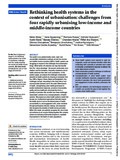| dc.contributor.author | Elsey, Helen | |
| dc.contributor.author | Agyepong, Irene | |
| dc.contributor.author | Huque, Rumana | |
| dc.contributor.author | Quayyem, Zahidul | |
| dc.contributor.author | Baral, Sushil | |
| dc.contributor.author | Ebenso, Bassey | |
| dc.contributor.author | Kharel, Chandani | |
| dc.contributor.author | Shawon, Riffat Ara | |
| dc.contributor.author | Onwujekwe, Obinna | |
| dc.contributor.author | Uzochukwu, Benjamin | |
| dc.contributor.author | Nonvignon, Justice | |
| dc.contributor.author | Aryeetey, Genevieve Cecilia | |
| dc.contributor.author | Kane, Sumit | |
| dc.contributor.author | Ensor, Tim | |
| dc.contributor.author | Mirzoev, Tolib | |
| dc.date.accessioned | 2022-03-27T09:21:50Z | |
| dc.date.available | 2022-03-27T09:21:50Z | |
| dc.date.copyright | 2019 | |
| dc.date.issued | 2019-06-16 | |
| dc.identifier.citation | Elsey, H., Agyepong, I., Huque, R., Quayyem, Z., Baral, S., Ebenso, B., . . . Mirzoev, T. (2019). Rethinking health systems in the context of urbanisation: Challenges from four rapidly urbanising low-income and middle-income countries. BMJ Global Health, 4(3) doi:10.1136/bmjgh-2019-001501 | en_US |
| dc.identifier.uri | http://hdl.handle.net/10361/16480 | |
| dc.description | This article was published in the BMJ Global Health [© Author(s) (or their employer(s)) 2019. Re-use permitted under CC BY. Published by BMJ and the definite version is available at: http://dx.doi.org/10.1136/bmjgh-2019-001501 The Journal's website is at: https://gh.bmj.com/content/4/3/e001501.abstract | en_US |
| dc.description.abstract | The world is now predominantly urban; rapid and
uncontrolled urbanisation continues across low-income
and middle-income countries (LMICs). Health systems are
struggling to respond to the challenges that urbanisation
brings. While better-off urbanites can reap the benefits
from the ‘urban advantage’, the poorest, particularly slum
dwellers and the homeless, frequently experience worse
health outcomes than their rural counterparts. In this
position paper, we analyse the challenges urbanisation
presents to health systems by drawing on examples from
four LMICs: Nigeria, Ghana, Nepal and Bangladesh. Key
challenges include: responding to the rising tide of noncommunicable diseases and to the wider determinants
of health, strengthening urban health governance to
enable multisectoral responses, provision of accessible,
quality primary healthcare and prevention from a
plurality of providers. We consider how these challenges
necessitate a rethink of our conceptualisation of health
systems. We propose an urban health systems model that
focuses on: multisectoral approaches that look beyond
the health sector to act on the determinants of health;
accountability to, and engagement with, urban residents
through participatory decision making; and responses
that recognise the plurality of health service providers.
Within this model, we explicitly recognise the role of data
and evidence to act as glue holding together this complex
system and allowing incremental progress in equitable
improvement in the health of urban populations. | en_US |
| dc.language.iso | en_US | en_US |
| dc.publisher | BMJ Journals | en_US |
| dc.relation.uri | https://gh.bmj.com/content/4/3/e001501.abstract | |
| dc.subject | Health Systems | en_US |
| dc.subject | Urbanisation | en_US |
| dc.subject | Low-income and Middle-income countries | en_US |
| dc.title | Rethinking health systems in the context of urbanisation: Challenges from four rapidly urbanising low-income and middle-income countries | en_US |
| dc.type | Journal Article | en_US |
| dc.description.version | Published | |
| dc.contributor.department | Brac James P. Grant School of Public Health | |
| dc.identifier.doi | http://dx.doi.org/10.1136/bmjgh-2019-001501 | |
| dc.relation.journal | BMJ Global Health | |

